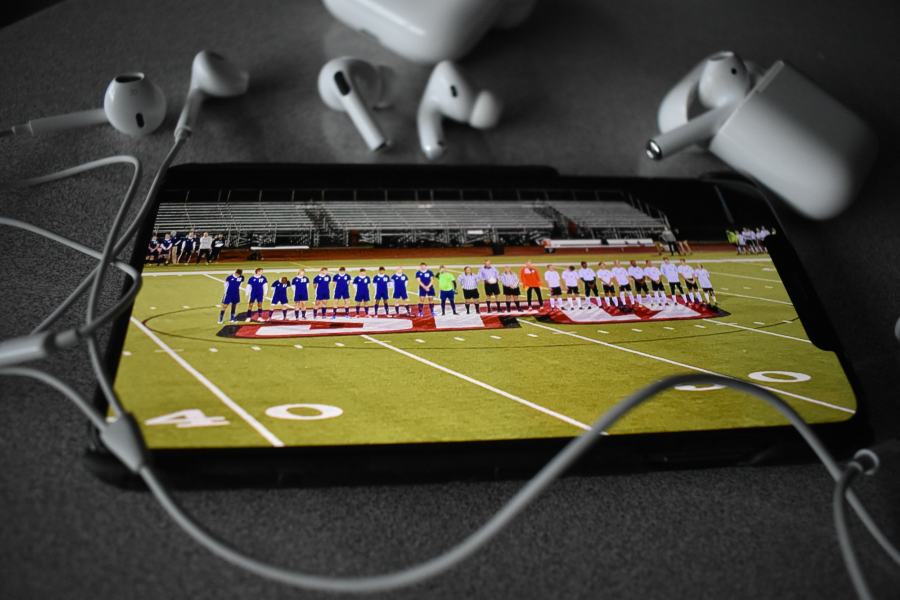Music’s effect on athletic performance
Listening to the right tunes can improve an athlete’s performance on the field and in the training room.
March 2, 2020
Last March the Lady Blue Devils basketball team took on West Middlesex in the PIAA state championship game.
One way to the Giant Center they prepared for the game by getting hyped up and listening to music, on the bus, in the locker room, and when they warmed up.
That’s nothing new. Athletes have included music as part of their pre-game rituals for decades, and research has shown that music has many positive benefits.
It’s easy to imagine how music affects mood and attitude, which could then affect sports performance.
Certain music or tempos affect the brain differently. If one is listening to a fast tempo song, she may increase her energy and work ethic; however, if one listens to a slow paced song, she won’t have as much energy and synchronized movement within the brain. Slower music may calm someone down and get them to relax, while upbeat music gets athletes hyped and prepared for the competition.
Music can lead to different types of mood depending on how your brain reacts to the music. Music can also lead to feelings of pleasure or displeasure, change thought process, and even can cause changes in behavior. Benefits include: increasing happiness, increasing performance in running, decreases stress while increasing overall health, reduces depression, and elevates your mood while driving. Although music has many positive benefits, does music affect athletic performance?
The effects of music lead to “higher -than-expected levels of endurance, power, productivity, or strength.
“As long as they have a good beat,” said B-A senior Travis Luensmann, an all-star pitcher committed to South Carolina who said he most frequently listens to rap music before he pitches. “Different people do different things to get ready for a game. For me, it’s more of a mental thing, where I run through what people have taught me over the years. With music, it’s about what the songs say. One Eminem songs says, ‘When your idols become your rivals,’ and I can definitely relate to that.”
Research has shown that listening to music activates the brain in many ways, such as pain reduction, stress relief, memory, and brain injuries. One study indicated the correct type of music can heighten an athletes’ performance by up to twenty percent. A 2010 study stated that music can improve performance in two ways: it can delay fatigue and increase work capacity. According to this study, the effects of music lead to “higher -than-expected levels of endurance, power, productivity, or strength.”
If an athlete listens to fast tempo music, they may be likely to increase their movements to a faster pace, possibly enhancing their athletic performance.
Bellwood-Antis athletes said they listen to music before games because it helps them get hyped up and ready for the competition. Freshmen Andrew Nycum and Nick Kost said they believe music affects their athletic performance because it gets them hyped up for the game, and they believe they perform better when listening to music.
Senior Olivia Mussleman participates in basketball and softball. Olivia said she listens to rap and pop music before games because it gets her ready and amped up for the game. Olivia also said that she believes listening to music does affect her athletic performance because it gets her ready to compete.
Junior Owen Shedlock participates in football and baseball. Owen said that he and his teammates listen to music that gets them pumped up and excited to play, though he stopped short of admitting it improves performance.
“I don’t think music necessarily affects your performance, but it can definitely help you get locked in and focused on what you’re doing,” Owen said they pretty much listen to the same style of music before and after games, he also said that they listen to the same music for different sports.
Head football coach Nick Lovrich agrees.
“I do not think music really affects performance that much. Some athletes say it gets them fired up, but for the most part they should be fired up because it is their game day,” he said.
The football team listens to music in the locker room over a speaker before and after their games. However, the coaches do not let the players have their phones in the locker room; therefore, they can’t listen to their own music.
“We let the seniors pick our playlist so they have a say in what we listen it,” said Coach Lovrich.
It’s not just athletes music affects, but also those participating in exercise. According to exactsports.com, listening to music during exercise could lead to a better workout. Scientists say listening to music while exercising can release feel-good chemicals in the brain. This may boost an athlete’s mood, dull pain, and make her less tired.
Scientists say listening to music while exercising can release feel-good chemicals in the brain. This may boost an athlete’s mood, dull pain, and make her less tired.
According to the National Center for Health Research, music that is motivational or synchronized with your exercise is shown to have physical and psychological effects. Studies have shown that faster-paced music tends to help improve athletic performance when a person engages in a low to moderate level exercise, either by increasing distance traveled, pace, or repetitions completed.
A 2006 study that looked at the effect of music on the selection of treadmill speed found that while listening to fast-paced music, participants increased their pace and distance traveled without becoming more tired. Other studies have come up with similar conclusions suggesting that listening to music with more beats per minute can enhance physical performance during low to moderate exercise level.
Music can enhance the positive aspects of mood such as happiness and excitement, while reducing negative aspects. People in general listen to music as a daily activity whether it be while they work, train, or even to get in a good mood. Therefore, it’s not just athletes that are being affected by music: it’s everybody that listens to music. With or without music, exercise is a very important part of your overall health.
According to owlcation.com, music improves memory, attention, physical coordination, and mental development. Certain music improves mood, intelligence, motivation and concentration. Psychology Today stated that when listening to music, an individual often possesses a work-enhancing effect and psychological effects. Music can increase physical capacity, improve energy efficiency, and influence mood.
Humans respond to music tempo and rhythm of music. They found that the higher the tempo, the better the performer is at higher intensity workouts according to sports journal. The Health Sciences Academy has stated that music can boost internal motivation by triggering good emotions, helping one experience much greater pleasure in the activity. Choosing music that you enjoy and that fits your exercise routine can help you get more out of your exercise performance.
In the end the evidence shows music has many positive effects on performance such as: delaying fatigue, increasing work capacity, decreasing boredom, increasing your stamina, mood, motivation, and according to research increasing performance ability. So what are you waiting for put those headphones in!
















